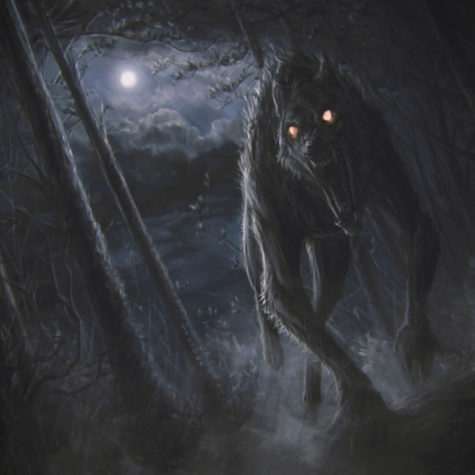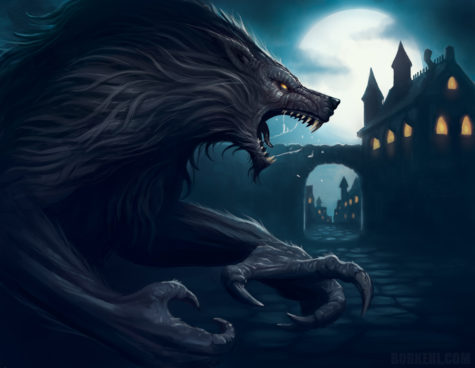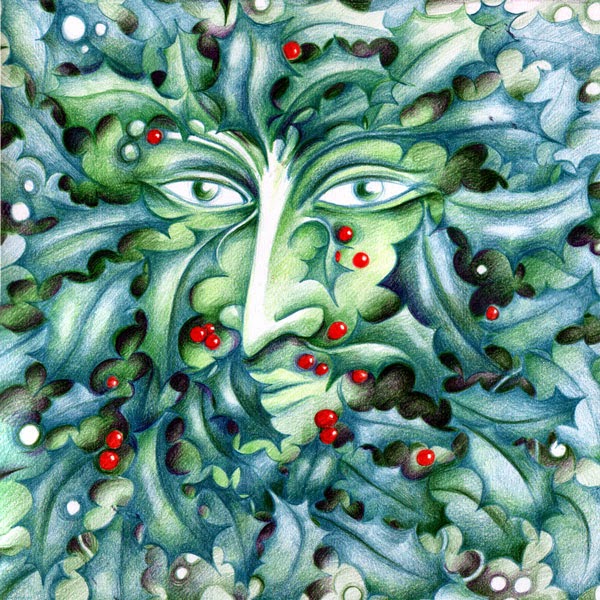Werewolf
A Narrow Escape
“The following story, which I believe to be true in the main, was told me by a Dr. Broniervski, whom I met in Boulogne.”
~Werwolves, by Elliott O’Donnell, first published in 1912.
“Ten years ago,” my informant began, “I was engaged in a geological expidition in Montenegro. I left Cetinge in company with my escort, Dugald Dalghetty, a Dalmatian who had served me on many former occasions; but owing to an accident I was compelled to leave him behind at a village about thirty miles east of the capital. As it was absolutely necessary for me to have a guide, I chose a Montenegrin called Kniaz.
Dalghetty warned me against him. ‘Kniaz has the evil eye,’ he said; ‘he will bring misfortune on you. Choose some one else.’
“Kniaz was certainly not particularly prepossessing. He was tall and angular, and pock-marked and sandy-haired; and his eyes had a peculiar cast – only a cast, of course, nothing more. To balance these detractions he was civil in his manners and extremely moderate in his terms. Dalghetty, faithful fellow, almost wept as he watched us depart. ‘I shall never see you again,’ he said. ‘Never!’
“Just outside the last cottage in the village we passed a gigantic, broad-shouldered man, clad in the usual clothes of frieze, a black skullcap, wide trousers, and tights from the knee to the ankle. Over his shoulders was a new white strookah, of which he seemed very proud; whilst he had a perfect armament of weapons – rifles, pistols, yatagan – polished up to the knocker – and cartouche-box.
He was conversing with a girl at one of the windows, but turned as we came up to him and leered impudently at Kniaz. The sallow in Kniaz’s cheeks turned to white, and the cast in his eyes became ten times more pronounced. But he said nothing – only drooped his head and shuffled a little closer to me.
“For the rest of the day he spoke little; and I could tell from his expression and general air of dejection that he was still brooding over the incident. The following morning – we stayed the night in a wayside inn – Kniaz informed me that the route we had intended taking to Skaravoski – the town I meant to make the head quarters for my daily excursions – was blocked (a blood feud had suddenly been declared between two tribes), and that consequently we should have to go by some other way.
I inquired who had told him and whether he was sure the information was correct. He replied that our host had given him the warning, and that the possibility of such an occurrence had been suggested to him before leaving Cetinge. ‘But,’ he added, ‘there is no need to worry, for the other road, though somewhat wild and rough, is, in reality, quite as safe, and certainly a good league and a half shorter.’
As it made no very great difference to me which way I went, I acquiesced. There was no reason to suspect Kniaz of any sinister motive – cases of treachery on the part of escorts are practically unknown in Montenegro – and if it were true that some of the tribes were engaged in a vendetta, then I certainly agreed that we could not give them too wide a berth. At the same time I could not help observing a strange innovation in Kniaz’s character.
Besides the sullenness that had laid hold of him since his encounter with the man and girl, he now exhibited a restless eagerness – his eyes were never still, his lips constantly moved, and I could frequently hear him muttering to himself as we trudged along. He asked me several times if I believed in the supernatural, and when I laughingly replied ‘No, I am far too practical and level-headed,’ he said ‘Wait. We are now in the land of spirits. You will soon change your opinion.’
“The country we were traversing was certainly forbidding – forbidding enough to be the hunting ground of legions of ferocious animals. But the supernatural! Bah! I flouted such an idea.
All day we journeyed along a lofty ridge, from which, shortly before dusk, it became necessary to descend by a narrow and precipitous declivity, full of danger and difficulty. At the bottom we halted three or four hours, to wait for the moon, in a position sufficiently romantic and uncomfortable. A north-east wind, cold and biting, came whistling over the hills, and seemed to be sucked down into the hollow where we sat on the chilly stones.
The moment we sighted the slightly depressed orb of the moon over the vast hill of rocks, and the Milky Way spanning the heavens with a brilliancy seen only in the East, we pushed on again. On, along a painfully rough and uneven track, flanked on either side by perpendicular masses of rock that reared themselves, black and frowning, like some huge ruined wall. On, till we eventually came to the end of the defile. Then an extraordinary scene burst upon us.
“Whilst the irregular line of rocks continued close on our left, beyond it – glittering in the miraculously magnifying moonlight with more gigantic proportions than nature had afforded – was a huge pile of white rocks, looking like the fortifications of some vast fabulous city. There were yawning gateways flanked by bastions of great altitude; towers and pyramids; crescents and domes; and dizzy pinnacles; and castellated heights; all invested with the unearthly grandeur of the moon, yet showing in their wide breaches and indescribable ruin sure proofs that during a long course of ages they had been battered and undermined by rain, hurricane, and lightning, and all the mighty artillery of time.
Piled on one another, and repeated over and over again, these strangely contorted rocks stretched as far as the eye could reach, sinking, however, as they receded, and leading the mind, though not the eye, down to the plain below, through which a turbid stream wound its way rebelliously, like some great twisting, twirling, silvery-scaled serpent.
“It was into this gorge that Kniaz in a voice thrilling with excitement informed me we must plunge.
“‘It is called,’ he explained to me, ‘the haunted valley, and it is said to have been from time immemorial under the spell of the grey spirits – a species of phantasm, half man and half animal, that have the power of metamorphosing men into wild beasts.’
Horses, he went on to inform me, showed the greatest reluctance to enter the valley, which was a sure proof that the place was in very truth phantom-ridden. I must say its appearance favoured that theory. The path by which we descended was almost perpendicular, and filled with shadows. Precipices hemmed us in on every side; and here and there a huge fragment of rock, standing like a petrified giant, its summit gleaming white in the moonbeams, barred our way.
“On reaching the bottom we found ourselves exactly opposite the pile of white rocks, at the base of which roared the stream. Kniaz now declared that our best plan was to halt and bivouac here for the night. I expostulated, saying that I did not feel in the least degree tired, that the spot was far from comfortable, and that I preferred to push on.
Kniaz then pleaded that he was too exhausted to proceed, and, in fact, whined to such an extent that in the end I gave way, and lying down under cover of a boulder, tried to imagine myself in bed. I did actually fall asleep, and awoke with the sensation of something crawling over my face.
Sitting up, I looked around for Kniaz – he was nowhere to be seen. The oddness of his behaviour, his alternate talkativeness and sullenness, and the anxiety he had manifested to come by this route, made me at last suspicious. Had he any ulterior motive in leading me hither? What had become of him? Where was he?
I got up and approached the margin of the stream, and then for the first time I felt frightened. The illimitable possibilities of that enormous mass of castellated rocks towering above me both quelled and fascinated me. Were these flickering shadows shadows, or – or had Kniaz, after all, spoken the truth when he said this valley was haunted?
The moonlight rendered every object I looked upon so startlingly vivid, that not even the most trivial detail escaped my notice, and the more I scrutinized the more firmly the conviction grew on me that I was in a neighbourhood differing essentially from any spot I had hitherto visited. I saw nothing with which I had been formerly conversant.
The few trees at hand resembled no growth of either the torrid, temperate, or northern frigid zones, and were altogether unlike those of the southern latitudes with which I was most familiar. The very rocks were novel in their mass, their colour, and their stratification; and the stream itself, utterly incredible as it may appear, had so little in common with the streams of other countries that I shrank away from it in alarm. I am at a loss to give any distinct idea of the nature of the water. I can only say it was not like ordinary water, either in appearance or behaviour.
Even in the moonlight it was not colourless, nor was it of any one colour, presenting to the eye every variety of green and blue. Although it fell over stones and rocks with the same rapid descent as ordinary water, it made no sound, neither splash nor gurgle.
Summoning up courage, I dipped my fingers in the stream; it was quite cold and limpid. The difference did not lie there. I was still puzzling over this phenomenon, still debating in my mind the possibility of the valley being haunted, when I heard a cry – a peculiarly ominous cry – human and yet animal. For a few seconds I was too overcome with fear to move. At last, however, having in some measure pulled myself together, I ventured cautiously in the direction of the noise, and after treading as lightly as I could over the rough and rocky soil for some couple of hundred yards, suddenly came to an abrupt standstill.
“Kneeling beside the stream with its back turned to me was an extraordinary figure – a thing with a man’s body and an animal’s head – a dark, shaggy head with unmistakable prick ears. I gazed at it aghast. What was it? What was it doing?
As I stared it bent down, lapped the water, and raising its head, uttered the same harrowing sound that had brought me thither. I then saw, with a fresh start of wonder, that its hands, which shone very white in the moonlight, were undergoing a gradual metamorphosis. I watched carefully, and first one finger, and then another, became amalgamated in a long, furry paw, armed with sharp, formidable talons.
“I suppose that in my fear and astonishment I made some sound of sufficient magnitude to attract attention; anyhow, the creature at once swung round, and, with a snarl of rage, rushed savagely at me. Being unarmed, and also, I confess, unnerved, I completely lost my presence of mind, and not attempting to escape – though flight would have been futile, for I was nothing of a runner – shrieked aloud for help.
The thing sprang at me, its jaws wide open, its eyes red with rage. I struck at it wildly, and have dim recollections of my puny blows landing on its face. It closed in on me, and gripping me tightly round the body with its sinewy arms, hurled me to the ground. My head came in violent contact with a stone, and I lost consciousness. On recovering my senses, I was immeasurably surprised to find Dalghetty sitting on a rock watching me, whilst close beside him was Kniaz, bloodstained and motionless.
“Dalghetty explained the situation. ‘Convinced that evil would befall you in the company of such a man,’ he said, pointing to the figure at his feet, ‘I determined to set out in pursuit of you. By a miracle, which I attribute to Our Lady, the effects of my accident suddenly wore off, and I felt absolutely well. I borrowed a horse, and, starting from Cetinge at nine this morning, reached the inn where you passed last night at eleven. There I learned the route you had taken, and leaving the horse behind – on such a road I was safer on my legs – I pressed on.
The ground, being moist in places, revealed your footprints, and I had no difficulty at all in tracing you to the bottom of the declivity. There I was at sea for some moments, since the rocky soil was too hard to receive any impressions. But hearing the howl of some wild animal, I concluded you were attacked, and, guided by the sound, I arrived here to find a werwolf actually preparing to devour you. A bullet from my rifle speedily rendered the creature harmless, and a close inspection of it proved that my surmises were only too correct. It was none other than our friend here with the evil eye – Kniaz!’
“‘Kniaz a werwolf!’ I ejaculated.
“‘Yes! he inveigled you here because he had made up his mind to drink the water of the enchanted stream, and so become metamorphosed from a man to a wild beast. His object in doing so was to destroy a young farmer who had stolen his sweetheart, and for whom he, as a man, was no match. However, he is harmless now, but it is a warning to you in future to trust no one who has the evil eye.'”
An Encounter With A Werewolf
From the book Werwolves, by Elliott O’Donnell, first published in 1912, we have this account of a lupine phantasm representing the personality of the werewolf which occurred in Estonia, on the shores of the Baltic.
A gentleman and his sister, whom I will call Stanislaus and Anno D’Adhemar, were invited to spend a few weeks with their old friends, the Baron and Baroness Von A—, at their country home in Estonia. On the day arranged, they set out for their friends’ house, and alighting at a little station, within twenty miles of their destination, were met by the Baron’s droshky.
It was one of those exquisite evenings – a night light without moon, a day shady without clouds – peculiar to that clime. Indeed, it seemed as if the last glow of the evening and the first grey of the morning had melted together, and as if all the luminaries of the sky merely rested their beams without withdrawing them.
To Stanislaus and Anno, jaded with the wear and tear of life in a big city, the calm and quiet of the country-side was most refreshing, and they heaved great sighs of contentment as they leaned far back amid the luxurious upholstery of the carriage, and drew in deep breaths of the smokeless, pure, scented air. Their surroundings modelled their thoughts. Instead of discussing monetary matters, which had so long been uppermost in their minds, they discoursed on the wonderful economy of happiness in a world full of toil and struggle; the fewer the joys, they argued, the higher the enjoyment, till the last and highest joy of all, true peace of mind, i.e., content, was the one joy found to contain every other joy.
Occasionally they paused to remark on the brilliant lustre of the stars, and, not infrequently, alluded to the Creator’s graciousness in allowing them to behold such beauty. Occasionally, too, they would break off in the midst of their conversation to listen to the plaintive utterings of some night bird or the shrill cry of a startled hare.
The rate at which they were progressing – for the horses were young and fresh – speedily brought them to an end of the open country, and they found themselves suddenly immersed in the deepening gloom of a dense and extensive forest of pines. The track now was not quite so smooth; here and there were big ruts, and Stanislaus and his sister were subjected to such a vigorous bumping that they had to hold on to the sides of the droshky, and to one another.
In the altered conditions of their travel, conversation was well-nigh impossible. The little they attempted was unceremoniously jerked out of them, and the nature of it – I am loath to admit – had somewhat deteriorated. It had, in fact, in accordance with their surroundings, undergone a considerable change.
“What a vile road!” Stanislaus exclaimed, clutching the side of the droshky with both hands to save himself from being precipitated into space.
“Yes – isn’t – it?” gasped Anno, as she lunged forward, and in a vain attempt to regain her seat fell on their handbag, which gave an ominous squish. “I declare there – there – will be – nothing left of me – by the – by the time we get there. Oh dear! Whatever shall I do? Wherever have you got to, Stanislaus?”
The upper half of Stanislaus was nowhere to be seen! His lower half, however, was discovered by his sister convulsively pressed against the side of the droshky. In another moment this, too, would undoubtedly have disappeared, and the lower extremities would have gone in pursuit of the upper, had not Anno with admirable presence of mind effected a rescue. She tugged at her brother’s coat-tails in the very nick of time, with the result that his whole body once again hove into view.
Just then a bird sang its final song before retiring for the night, and Stanislaus, hot and trembling all over, shouted out: “What a hideous noise! I declare it quite frightened me”; whilst Anno shuddered and put her fingers in her ears. They once more abused the road; then the trees.
“Great ugly things,” they said; “they shut out all the light.”
And then they abused the driver for not looking out where he was going, and finally they began to abuse one another. Anno abused Stanislaus, because he had disarranged her hat and hair, and Stanislaus, Anno, because he couldn’t hear all she said, and because what he did hear was silly. Then the Stygian darkness of the great pines grew; and the silence of wonder fell on the two quarrellers.
On, on, on rolled the droshky, a monotonous rumble, rumble, that sounded very loud amid the intense hush that had suddenly fallen on the forest. Stanislaus and Anno grew drowsy; the cold night air, crowning their exertions of the day, induced sleep, and they were soon very much in the land of nods: Stanislaus with his head thrust back as far as it would go, and Anno with her head leaning slightly forward and her chin deeply rooted in the silvery recesses of her rich fur coat.
The driver stopped for a moment. He had to attend to his lights, which, he reflected, were behaving in rather an odd manner. Then, scratching his head thoughtfully, he cracked his whip and drove hurriedly on. Once again, rumble, rumble, rumble; and no other sounds but far away echoes and the gentle cooing of a soft night breeze through the forked and ragged branches of the sad and stately pines. On, on, on, the light uncertain and the horses brisk.
Suddenly the driver hears something – he strains his ears to catch the meaning of the sounds – a peculiar, quick patter, patter – coming from far away in the droshky’s wake. There is something – he can’t exactly tell what – in those sounds he doesn’t like; they are human, and yet not human; they may proceed from some one running – some one tall and lithe, with an unusually long stride. They may – and he casts a shuddering look over his shoulder as the thought strikes him – they may be nothing human – they may be the patter of a wolf! A huge, gaunt, hungry wolf! an abnormally big wolf! a wolf with a gallop like that of a horse!
The driver was new to these parts; he had but lately come from the Baron’s establishment in St. Petersburg. He had never been in this wood after dark, and he had never seen a wolf save in the Zoological Gardens. The atmosphere now began to sharpen. From being merely cold it became positively icy, and muttering, “I never felt anything like this in St. Petersburg,” the driver shrank into the depths of his furs, and tried to settle himself more comfortably in his seat.
The horses, too, four in number, were strangers in Estonia, the Baron having only recently paid a heavy price for them in Nava on account of their beauty. Not that they were merely handsome; despite their small and graceful build, and the glossy sleekness of their coats, they were both strong and spirited, and could cover twenty-five versts without a pause. But now they, too, heard the sounds – there was no doubt of that – and felt the cold.
At first they shivered, then whined, and then came to an abrupt halt; and then, without the slightest warning, tore the shifting tag and rag tight around them, and bounding forward, were off like the wind. Then, away in their rear, and plainly audible above the thunder of their hoofs, came a moaning, snarling, drawn-out cry, which was almost instantly repeated, not once, but again and again.
Stanislaus and Anno, who had been rudely awakened from their slumbers by the unusual behaviour of the horses, were now on the qui vive.
“Good heavens! What’s that?” they cried in chorus.
“What’s that, coachman?” shrieked Anno, digging the shivering driver in the back.
“Volki, mistress, volki!” was the reply, and on flew the droshky faster, faster, faster!
To Stanislaus and Anno the word “wolves” came as a stunning shock. All the tales they had ever heard of these ferocious beasts crowded their minds at once. Wolves! was it possible that those dreadful bogies of their childhood – those grim and awful creatures, grotesquely but none the less vividly portrayed in their imagination by horror-loving nurses – were actually close at hand! Supposing the brutes caught them, who would be eaten first? Anno, Stanislaus, or the driver? Would they devour them with their clothes on? If not, how would they get them off?
Then, filled with morbid curiosity, they strained their ears and listened. Again – this time nearer, much nearer – came that cry, dismal, protracted, nerve-racking. Nor was that all, for they could now discern the pat-pat, pat-pat of footsteps – long, soft, loping footsteps, as of huge furry paws or naked human feet. However, they could see nothing – nothing but blackness, intensified by the feeble flickering of the droshky’s lanterns.
“Faster! drive faster!” Anno shouted, turning round and poking the coachman in the ribs with her umbrella. “Do you want us all to be eaten?”
“I can’t mistress, I can’t!” the man expostulated; “the horses are outstripping the wind as it is. They can’t go quicker.” And the driver, consigning Stanislaus and his sister to the innermost recesses of hell, prayed to the Virgin to save him.
Nearer and nearer drew the steps, and again a cry – a cry close behind them, perhaps fifty yards – fifty yards at the most. And as they were trying to locate it there burst into view a gigantic figure – nude and luminous, a figure that glowed like a glow-worm and bent slightly forward as it ran. It covered the ground with long, easy, swinging strides, without any apparent effort.
In general form its body was like that of a man, saving that the limbs were longer and covered with short hair, and the feet and hands, besides being larger as a whole, had longer toes and fingers. Its head was partly human, partly lupine – the skull, ears, teeth, and eyes were those of a wolf, whilst the remaining features were those of a man. Its complexion was devoid of colour, startlingly white; its eyes green and lurid, its expression hellish.
Stanislaus and Anno did not know what to make of it. Was it some terrible monstrosity that had escaped from a show, or something that was peculiar to the forest itself, something generated by the giant trees and dark, silent road? In their sublime terror they shrieked aloud, beat the air with their hands to ward it off, and finally left their seats to cling on to the back of the driver’s box.
But it came nearer, nearer, and nearer, until they were almost within reach of its arms. They read death in the glinting greenness of its eyes and in the flashing of its long bared teeth. The climax of their agony, they argued, could no longer be postponed. The thing had only to make a grab at them and they would die of horror – die even before it touched them. But this was not to be.
They were still staring into the pale malevolent face drawing nearer and nearer, and wondering when the long twitching fingers would catch them by the throats, when the droshky with a mad swirl forward cleared the forest, and they found themselves gazing wildly into empty moonlit space, with no sign of their pursuer anywhere.
An hour later they narrated their adventure to the Baron. Nothing could have exceeded his distress. “My dear friends!” he said, “I owe you a profound apology. I ought to have told my man to choose any other road rather than that through the forest, which is well known to be haunted. According to rumour, a werwolf – we have good reason to believe in werwolves here – was killed there many years ago.”
The Case of the Abbot Gilbert
From the book Werwolves, by Elliott O’Donnell, first published in 1912, we have this account of the case of the Abbot Gilbert of the Arc Monastery, on the banks of the Loire.
Gilbert had been to a village fair, where the good vintage and hot sun combined had proved so trying that on his way home, through a dense and lonely forest, he had gone to sleep and been thrown from his horse. In falling he had bruised and cut himself so prodigiously that the blood from his wounds attracted to the spot a number of big wild cats.
Taken at a strong disadvantage, and without any weapons to defend himself, Gilbert would soon have fallen a victim to the ferocity of these savage creatures had it not been for the opportune arrival of a werwolf. A desperate battle at once ensued, in which the werwolf eventually gained the victory, though not without being severely lacerated.
Despite Gilbert’s protestations, for he was loath to be seen in such strange company, the werwolf accompanied him back to the monastery, where, upon hearing the Abbot’s story, it was enthusiastically welcomed and its wounds attended to.
At dawn it was restored to its natural shape, and the monks, one and all, were startled out of their senses to find themselves in the presence of a stern and awesome dignitary of the Church, who immediately began to lecture the Abbot for his unseemly conduct the previous day, ordering him to undergo such penance as eventually, robbing him of half his size and all his self-importance, led to his resignation.
James Cheney: Invocation To The Dark Mother
Daniel: Prayer Before The Final Battle
blessed obyno: Queen of Ghosts
blessed obyno: Queen of Ghosts
Caerlion Arthur: The Great, Bloody and Bruised Veil of the World






